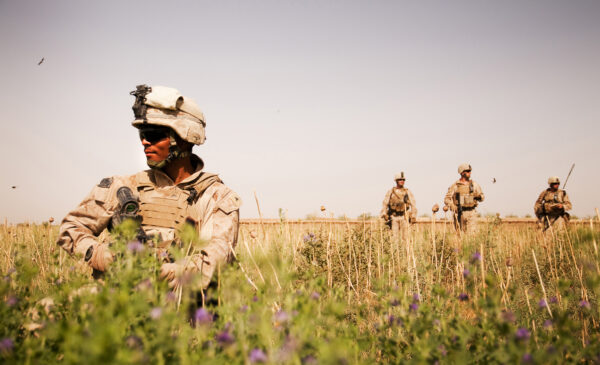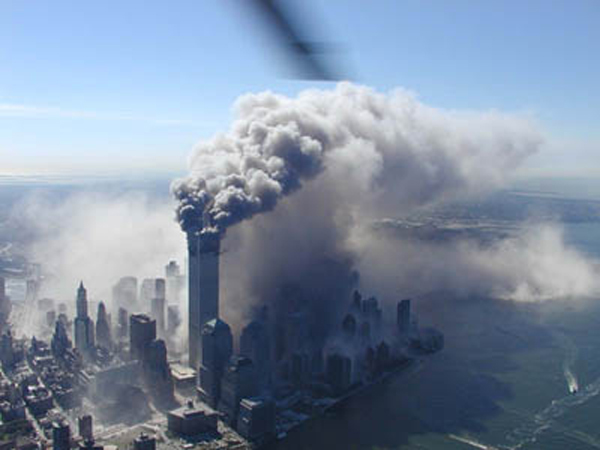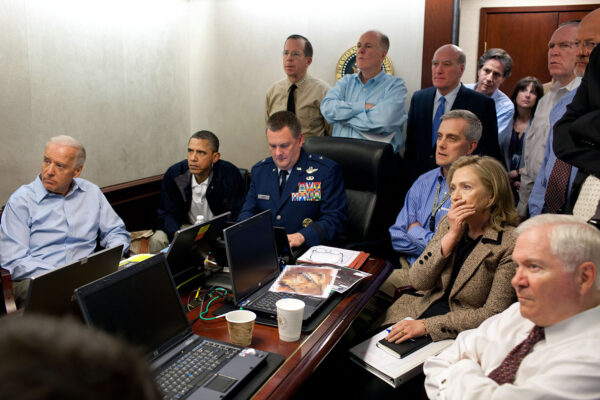
U.S. Marines patrolling in Helmand province in 2010. (Photo: U.S. Marine Corps)
On Aug. 30, 2021, the United States formally withdrew from Afghanistan.
In 20 years of war, hundreds of thousands of Americans served. Tens of thousands were wounded. And 2,611 never came home.
Prelude to the War in Afghanistan: The Attacks on Sept. 11, 2001
On Sept. 11, 2001, four commercial airliners were hijacked by extremists later confirmed to belong to the terror organization Al-Qaeda. Nearly 3,000 people died in the attacks and the world changed overnight.
Al-Qaeda, a terror organization primarily based in Central Asia and the Middle East was blamed — and years later claimed responsibility for the attack — while the Taliban of Afghanistan were held responsible for sheltering the terror group and its leader, Osama bin Laden.
The attacks represented the first time since the surprise Attack on Pearl Harbor that a foreign entity openly attacked the United States, and launched the country into two decades of war.

Taken from a helicopter just after the south tower of the World Trade Center in New York City had fallen during the Sept. 11 Attacks. (Photo: U.S. EPA)
Oct. 7, 2001: 20 Years of Instability and War in Afghanistan
Soon after the Sept. 11 Attacks, and after President George W. Bush declared a Global War on Terror, U.S.-led forces invaded Afghanistan. Within months, Coalition forces, on paper, controlled virtually all of Afghanistan and had begun the process of installing a democratic regime.
Despite this seeming victory, both Al-Qaeda and the Taliban were able to flee and regroup in Pakistan, ensuring the war could continue indefinitely. And it did. While Coalition forces maintained control of all of Afghanistan’s population centers, instituting some measure of democratic progress and economic advancement, control over rural communities remained elusive.
May 2, 2011: Osama bin Laden Is Killed by U.S. Forces
Nine years after Osama bin Laden escaped Afghanistan during the Battle of Tora Bora, the CIA discovered that the Al-Qaeda leader was living at a compound in a residential area of Abbottabad, Pakistan. In a subsequent operation that nearly caused a diplomatic incident with Pakistan, bin Laden was killed.
Hours later, President Barack Obama proclaimed, “justice has been done” to the American public. But despite bin Laden’s death, the war continued as U.S. Forces looked to stabilize the young Afghan government in the face of a growing Taliban-led insurgency.

A view of the Situation Room during Operation Neptune Spear.
(Photo: U.S. White House Archive, Pete Souza)
Aug. 15, 2021: The Last C-17 Departs Kabul, Ending U.S. Involvement in the War
Over the next decade, the United States and NATO changed their mission in Afghanistan, gradually withdrawing coalition forces and reverting to a support role while the Afghan Army took over most combat operations. By spring 2021, only a token force of Coalition troops remained in the country — down from a peak of 100,000 in 2010.
The Taliban, which had reasserted its presence as early as 2003, began seizing land and power from the Afghan government at a breakneck pace after news of a full U.S. withdrawal was confirmed. Weary of two decades of war and little to show for it, the United States offered only limited support to the failing Afghan Army.
Legacy of the War in Afghanistan
Over 170,000 Afghani civilians are estimated to have been killed during the War in Afghanistan. Historians still largely debate both its purpose and its legacy.
The remnants of the Coalition-sanctioned Afghan government exist purely in exile. The Taliban has reclaimed full control, and worse, has only been empowered by America’s speedy withdrawal as thousands of weapons and vehicles were left behind because it was cheaper to abandon them than to bring them home.
Al-Qaeda’s influence and power has dramatically faltered, but this has only led to the rise of new terror groups like Islamic State Khorasan.
Many note similarities between the U.S Withdrawal from Afghanistan to the final days of the Vietnam War nearly five decades prior. Although life under Taliban leadership has rolled back any hope for progress in Afghanistan. Women especially suffer under the new regime, which has returned the country to an extreme form of Islamic rule.
Most Veterans have mixed feelings about the withdrawal. Many see it as a betrayal to those who served and the Afghani people. Some feel that the withdrawal could have been handled better — or that the resurgence of the Taliban necessitated a renewed commitment from the United States. The general public has largely been apathetic, although Veterans of Afghanistan have been spared the treatment their forebears received following the Vietnam War.
Read about more veterans holidays and important events.












